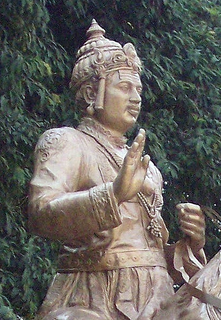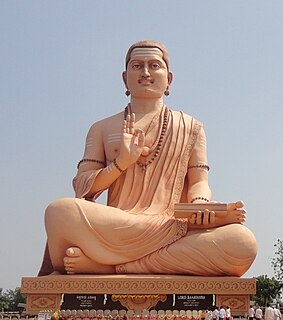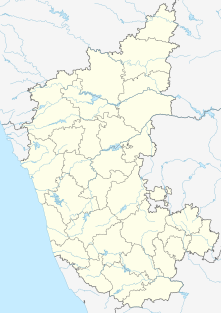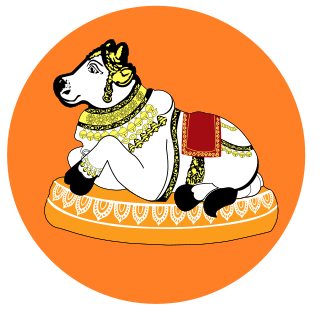
Lingayatism is a Shaivite Hindu religious tradition in India. Initially known as Veerashaivas, since the 12th century adherents of this faith are known as Lingayats. The terms Lingayatism and Veerashaivism have been used synonymously, but Veerashaivism may refer to the broader Veerashaiva philosophy which predates Lingayatism, to the historical community now called Lingayats, and to a contemporary (sub)tradition within Lingayatism with Vedic influences.

Basavanna was an Indian 12th-century statesman, philosopher, poet, Lingayat saint in the Shiva-focussed Bhakti movement, and Hindu Shaivite social reformer during the reign of the Kalyani Chalukya/Kalachuri dynasty. Basavanna was active during the rule of both dynasties but reached his peak of influence during the rule of King Bijjala II in Karnataka, India .

The cuisine of Karnataka includes the cuisines of the different regions and communities of Karnataka, namely, North Karnataka cuisine, South Karnataka cuisine, Udupi cuisine, Saraswat cuisine, Coorg cuisine, Mangalorean Catholic cuisine and Navayath cuisine.
Channabasavanna also known as " Guru Channabasaveshwara " was Basava's nephew and one of the foremost Sharanas of the 12th century. He, along with Basava, Allama Prabhu and Akka Mahadevi, played a pivotal role in the propagation of the Lingayat faith. He was the youngest among the sharana leaders and grew up in the household of Basavanna as he was the son of Nagalambike, Basava's own sister. He also wrote the Karana Hasuge which is one of the most sacred texts of the Lingayats, among many vachanas. He propounded the "shatasthala" philosophy associated with the six holy places of Veerashaiva Lingayat creed. He succeeded to the Shunya Simhasana at Anubhava Mantapa, Kalyana after the departure of Allama Prabhu, circa 1162ad. His young shoulders carried on the legacy of Basava after the latter's departure to Kudalasangama in 1162ad. He is credited to have systematised the entire manual of simple rituals for the followers. He was a strong advocate of the Ishtalinga wearing and expounded the material as well as the esoteric meaning of that divine symbol. He held together the nascent group of Shivasharanas and Jangmas in tumultuous times of clashes with the orthodox Brahmins and heretic Jains. Following the assassination of Kalachuri King Bijjala II in 1167 A.D, Channabasava along with his followers migrated to Ulavi safeguarding the Vachana literature. He attained Samadhi state there at the age of 25 passing on the leadership of the movement to Siddarama.

Kudalasangama in India is an important centre of pilgrimage for Lingayats. It is located about 15 kilometres (9.3 mi) from the Almatti Dam in Bagalkot district of Karnataka state. The Krishna and Malaprabha River rivers merge here and flow east towards Srisailam Andhra Pradesh. The Aikya Mantapa or the holy Samādhi of Basavanna, the founder of the Lingayat sect of Hindu religion along with Linga, which is believed to be self-born (Swayambhu), is here. The Kudala Sangama Development Board takes care of the maintenance and development.

Ulavi is a village in the Uttara Kannada district in the Indian state of Karnataka. Ulavi is a village about 75 kilometres (47 mi) from Karwar in Karnataka state, India.

Lingadahalli is a village in Tarikere Taluk, Chikkamagaluru district, Karnataka, India. Lingadahalli is one of the prominent pre-historic sites in Karnataka state.
Anubhava Mantapa, established by Basavanna in the 12th Century C.E. is located in Basavakalyan in Bidar district of Karnataka. It is the first religious parliament in the world whose literal meaning is "experience pavilion", and was an academy of mystics, saints and philosophers of the lingayat faith in the 12th century. It was the fountainhead of all religious and philosophical thought pertaining to the lingayat. It was presided over by the mystic Allama Prabhu and numerous Sharanas from all over Karnataka and other parts of India were participants. This institution was also the fountainhead of the Vachana literature which was used as the vector to propagate Veerashaiva religious and philosophical thought. Other giants of veerashaiva theosophy like Akka Mahadevi, Channabasavanna and Basavanna himself were participants in the Anubhava Mantapa. The Anubhava Mantapa also called as the Mahaamane.
The concept of Shatsthala or Six (Ṣaṭ/ಷಟ್) Phases/Stages (Sthala/ಸ್ಥಲ) is pivotal to the Lingayat tradition. Shatsthala is a conflation of Shat and Sthala which means 'six phases/states/levels' through which a person advances in one's ultimate quest of realisation of the Supreme, or, simply put, enlightenment. The Shatsthala comprises the Bhakta Sthala, Maheshwara Sthala, Prasadi Sthala, Pranalingi Sthala, Sharana Sthala and the Aikya Sthala. The Aikya Sthala is the culmination where the soul leaves the physical body and merges with the Supreme.

Vachana sahitya is a form of rhythmic writing in Kannada that evolved in the 11th century CE and flourished in the 12th century, as a part of the Sharana movement. Madara Chennaiah an 11th-century cobbler-saint who lived during the reign of the Western Chalukyas and who is regarded by some scholars as the "father of Vachana poetry." The word "vachanas" literally means "(that which is) said". These are readily intelligible prose texts.
Channappa D. Uttangi was an Indian author and poet.

Malleshappa Madivalappa Kalburgi, commonly known as M. M. Kalburgi, was an Indian scholar of Vachana sahitya in the Kannada-language and academic who served as the vice-chancellor of Kannada University in Hampi. A noted epigraphist of Kannada, he was awarded the National Sahitya Akademi Award in 2006 for Marga 4, a collection of his research articles.

Chadchan is a town in the southern state of Karnataka, India. It is located in Bijapur district in northern part of Karnataka.

Manjula was an Indian film actress who acted in Kannada language films and also few Tamil and Telugu films. She was one of the most successful and prominent actresses of Kannada films in 1970s and 1980s. She acted in more than 100 films and won several awards for her performances, including a Filmfare Award.

The Basava Purana is a 13th-century Telugu epic poem. It was written by Palkuriki Somanatha. It is a sacred text of Lingayat. The epic poem narrates the life story of philosopher and social reformer Basava, the founder of Lingayat. He is also known by several other names such as Basavanna, Basaweshwara, Basavesha, and Basavaraja. It is also an anthology of several Lingayat saints and their philosophies. In contrast to campu style, Somanatha adopted the desi (native) style and composed the purana in dwipada (couplets), a meter popular in oral tradition and closely related to folk songs.
Sharana (Kannada:ಶರಣ) meaning "to surrender" denotes egoless surrender and refuge in Shiva, the Deity of Hinduism. In practice, the word sharana refers specifically to a person who is a follower of the Lingayat tradition. Sharanas through centuries were responsible for the spread of Lingayatism in India.
Jayadevitai Ligade is an Indian writer in the Kannada language. She became the president of Kannada Sahitya Parishattu. She fought to unify Sholapur with Karnataka on the linguistic grounds of majority Kannada-speaking community in the city. She has published several books on sharana sahitya in Kannada and Marathi, and wrote Siddarama purana, Sri Siddarameshwara. She also helped by paying some donation in inventing and publishing sharana sahitya.

Indrajit Lankesh is an Indian filmmaker, producer, and director of Kannada, Telugu and Hindi films. He is also the publisher of the weekly Kannada tabloid Lankesh Patrike. He is the son of iconic writer, journalist and film maker P. Lankesh.

Hinduism is the third largest religion of the world and the most observed religious traditions of India. It is the largest religion in Karnataka, the southwest Indian state. Several great empires and dynasties have ruled over Karnataka and many of them have contributed richly to the growth of Hinduism, its temple culture and social development. These developments have reinforced the "Householder tradition", which is of disciplined domesticity, though the saints who propagated Hinduism in the state and in the country were themselves ascetics. The Bhakti movement, of Hindu origin, is devoted to the worship of Shiva and Vishnu; it had a telling impact on the sociocultural ethos of Karnataka from the 12th century onwards.










